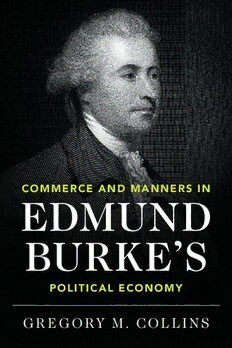
Commerce and Manners in Edmund Burke's Political Economy PDF
Preview Commerce and Manners in Edmund Burke's Political Economy
COMMERCE AND MANNERS IN EDM U N D BU R K E’S POLITICAL ECONOMY G R E G O R Y M . C O L L I N S CommerceandMannersinEdmundBurke’sPoliticalEconomy Although many of Edmund Burke’s speeches and writings contain prominenteconomicdimensions,hiseconomicthoughtseldomreceives theattentionitwarrants.CommerceandMannersinEdmundBurke’s Political Economy stands as the most comprehensive study to date of thisfascinatingsubject.Inadditiontoprovidingrigoroustextualana- lysis,Collinsunearthspreviouslyunpublishedmanuscriptsandemploys empirical data to set out a rich historical and theoretical context for Burke’seconomicbeliefs.CollinsintegratesBurke’sreflectionsontrade, taxation,andrevenuewithinhisunderstandingofthelimitsofreason andhisbroaderconceptionofempire.Suchreflectionsdemonstratethe waysthatcommerce,ifproperlymanaged,couldbeaninstrumentfor both public prosperity and imperial prestige. More important, CommerceandMannersinEdmundBurke’sPoliticalEconomyraises timely ethical questions about capitalism and its limits. In Burke’s judgment, civilizations cannot endure on transactional exchange alone, and markets require ethical preconditions. There is a grace to lifethatcannotbebought. Gregory M. Collins is Postdoctoral Associate and Lecturer in the ProgramonEthics,Politics,andEconomicsatYaleUniversity. Commerce and Manners in Edmund ’ Burke s Political Economy GREGORY M. COLLINS YaleUniversity UniversityPrintingHouse,Cambridgecb28bs,UnitedKingdom OneLibertyPlaza,20thFloor,NewYork,ny10006,USA 477WilliamstownRoad,PortMelbourne,vic3207,Australia 314–321,3rdFloor,Plot3,SplendorForum,JasolaDistrictCentre, NewDelhi–110025,India 79AnsonRoad,#06–04/06,Singapore079906 CambridgeUniversityPressispartoftheUniversityofCambridge. ItfurtherstheUniversity’smissionbydisseminatingknowledgeinthepursuitof education,learning,andresearchatthehighestinternationallevelsofexcellence. www.cambridge.org Informationonthistitle:www.cambridge.org/9781108489409 doi:10.1017/9781108776813 ©GregoryM.Collins2020 Thispublicationisincopyright.Subjecttostatutoryexception andtotheprovisionsofrelevantcollectivelicensingagreements, noreproductionofanypartmaytakeplacewithoutthewritten permissionofCambridgeUniversityPress. Firstpublished2020 PrintedintheUnitedKingdombyTJInternationalLtd.PadstowCornwall AcataloguerecordforthispublicationisavailablefromtheBritishLibrary. LibraryofCongressCataloging-in-PublicationData names:Collins,GregoryM.,1986–author. title:CommerceandmannersinEdmundBurke’spoliticaleconomy/GregoryM.Collins. description:Cambridge,UnitedKingdom;NewYork,NY:CambridgeUniversityPress, 2020.|Includesbibliographicalreferencesandindex. identifiers:lccn2019049024(print)|lccn2019049025(ebook)|isbn 9781108489409(hardback)|isbn9781108776813(epub) subjects:lcsh:Burke,Edmund,1729–1797–Politicalandsocialviews.|Economics– GreatBritain–History–18thcentury.|Politicalscience–GreatBritain–History–18th century.|Rationalism–History–18thcentury. classification:lcchb103.b87C652020(print)|lcchb103.B87(ebook)|ddc 381.01–dc23 LCrecordavailableathttps://lccn.loc.gov/2019049024 LCebookrecordavailableathttps://lccn.loc.gov/2019049025 isbn978-1-108-48940-9Hardback CambridgeUniversityPresshasnoresponsibilityforthepersistenceoraccuracyof URLsforexternalorthird-partyinternetwebsitesreferredtointhispublication anddoesnotguaranteethatanycontentonsuchwebsitesis,orwillremain, accurateorappropriate. ToRochelle Contents ListofFigures pagexi ListofTables xii Acknowledgments xiii Introduction 1 TheProblem:MarketsandSocialOrder 1 InterpretationsofBurke’sPoliticalEconomy 8 TerminologyofPoliticalEconomyandBurke’sUseofEmpirical Information 12 Conclusion 14 part i biography 1 BiographyandBurke’sAuthorityasaPoliticalEconomist 19 1.1 TheRootsofBurke’sInterestintheScienceofPoliticalEconomy 19 1.2 BurkeasaPoliticalEconomist 27 1.3 Conclusion 31 part ii market economies 2 ThoughtsandDetailsonScarcity,SupplyandDemand, andMiddlemen 37 2.1 Introduction 37 2.2 TheStressesofEngland’sAgriculturalEconomyinthe1790s andtheDraftingofThoughtsandDetails 38 2.3 TheLawsofSupplyandDemand,Wages,andPriceTheory 44 2.4 Middlemen 57 2.5 The1772RepealofStatutesBanningForestalling,Regrating, andEngrossing 70 2.6 Conclusion 76 vii viii Contents 3 AgriculturalPolicy,Labor,andWealthRedistribution 78 3.1 Introduction 78 3.2 TheCornLawsandExportBounties 78 3.3 Enclosure 88 3.4 Labor,theLaboringPoor,andtheRichasTrustees 92 3.5 WealthRedistributionandEqualityinThoughtsandDetails 109 3.6 Conclusion 114 4 Markets,Rationalism,andtheHayekConnection 117 4.1 Introduction 117 4.2 England’sGrainTradeandNationalPolicy 118 4.3 VoluntaryContractsandMarketExchange 119 4.4 Incentive,Reciprocity,andCommercialVirtues 123 4.5 Laissez-FaireandtheRoleofStateRegulation 127 4.6 RationalisminThoughtsandDetails 131 4.7 RationalismandtheHayekConnection 136 4.8 BurkeandAdamSmith 139 4.9 Conclusion 143 part iii the british constitution and economical reform 5 TheBritishConstitution:Burke’sProgramofEconomical ReformandtheRoleoftheState 151 5.1 Introduction 151 5.2 Wyvill’sMovementandtheSpiritofConstitutionalReform 153 5.3 SpeechonEconomicalReformI:PrivateLand,Contracts, andtheBoardofTrade 159 5.4 SpeechonEconomicalReformII:Pensions,CostlyOffices, andtheCivilList 169 5.5 AftermathandInfluence 189 5.6 Burke’sTrusteeTheoryofRepresentationandHisConception ofReform 191 5.7 Conclusion 199 part iv foreign trade 6 AccountoftheEuropeanSettlementsinAmerica,theBritish WestIndies,andtheFreePortActof1766 209 6.1 Introduction 209 6.2 BritishCommercialPolicyandtheNavigationActs 213 6.3 AnAccountoftheEuropeanSettlementsinAmerica 217 6.4 TheBritishWestIndiesandtheFreePortActof1766 235 6.5 Conclusion 245 7 ObservationsonaLateStateoftheNationandthePolitical EconomyofAnglo-AmericanImperialRelations 248 7.1 BritishImperialPolicyandtheAmericanColonies 248 Contents ix 7.2 ObservationsonaLateStateoftheNation 251 7.3 TheAmericanWarandtheNavigationActs:Speech onAmericanTaxationandSpeechonConciliationwithAmerica 275 7.4 Conclusion 297 8 Anglo-IrishCommercialRelations,TwoLettersontheTrade ofIreland,andthePoliticsofFreeTrade 299 8.1 Introduction 299 8.2 TheCommercialTensionsbetweenEnglandandIreland 300 8.3 TheIrishTradeBillsandTwoLettersontheTradeofIreland 306 8.4 IrishTrade,Nature,Principle,andPrudence 322 8.5 Pitt’sCommercialPropositions 334 8.6 TheAnglo-FrenchCommercialTreatyof1786 337 8.7 TheQuestionofMercantilismRevisited 339 8.8 Conclusion 342 part v india 9 Britain’sEastIndiaCompany,IndianMarkets,andMonopoly 347 9.1 Introduction 347 9.2 ThePoliticsoftheEastIndiaCompany 350 9.3 Burke’sGeneralPrinciplesofTradingMonopolies 356 9.4 NinthReportofSelectCommitteeI:MarketsandtheCorruption ofSupplyandDemandLaws 358 9.5 NinthReportofSelectCommitteeII:Monopoly 366 9.6 Conclusion 369 10 SpeechonFox’sIndiaBill,SixMercantilePrinciples, andtheDangerofPoliticalCommerce 371 10.1 TheEastIndiaCompany,EleventhReportofSelectCommittee, andSpeechonFox’sIndiaBill 371 10.2 SpeechonFox’sIndiaBillandtheDestructionoftheLocal EconomyandCulture 384 10.3 PoliticalCommerce,Avarice,andArbitraryRule 390 10.4 Conclusion 397 part vi the french revolution 11 ReflectionsontheRevolutioninFrance:Property,theMonied Interest,andtheAssignats 405 11.1 Introduction 405 11.2 ThePoliticalEconomyoftheAncienRégime 407 11.3 PropertyasaConstitutionalBulwark 411 11.4 TheFrenchRevolution’sAttackonChurchProperty 419 11.5 TheMoniedInterestandtheAssignats 427 11.6 TheRelationbetweentheMoniedInterestandtheLandedInterest 447
